
Circuit Training 110: Robin Ince, Not Just Bob-Bob-Bobbing Along
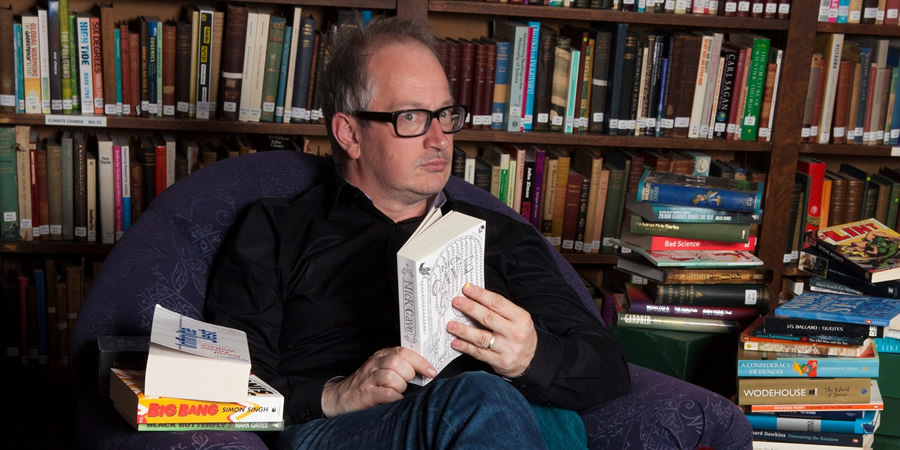
Christmas time: mistletoe and wine, but not necessarily many children singing Christian rhyme. Or much mistletoe this year actually, given all that's gone on. But one tradition is back for Festivemas 2017 - Robin Ince's Nine Lessons and Carols for Godless People, the brainiest yuletide variety show since that festive edition of Noel Edmonds' Multicoloured Swap Shop where Richard Dawkins, Carl Sagan and Newsround's John Craven did a phone-in about how Santa Claus never existed [Editor's note: this never happened].
This four-show extravaganza features a vast cast that varies each night, from comics Stewart Lee and Josie Long to scientists Simon Singh and Dr Suze Kundu, music types Grace Petrie, Steve Pretty and She Makes War, plus poets, anarchist cooks, naturalists (very different to naturists) and lots more besides.
Ince is best known to a lot of armchair folks for his double-act with Brian Cox on Radio 4's The Infinite Monkey Cage, and as well as ongoing live work the pair have a thoroughly enjoyable new book out: How to Build a Universe, which is timely because, crikey, this one could do with some DIY.
He's also back doing solo gigs, after quitting for a while, during which time he co-created The Cosmic Shambles Network as a platform for clever/comedic projects. It's easy to ignore what an important figure Ince has been on the live comedy scene too, creating completely new environments for funny people to perform in. Without his input, many of our more cerebral comics might have struggled for places to play, a lot of entertaining thinkers may never have found a wider audience, and we probably wouldn't begin a British Comedy Guide feature with a chat about religion.
Bloody Incepirational.
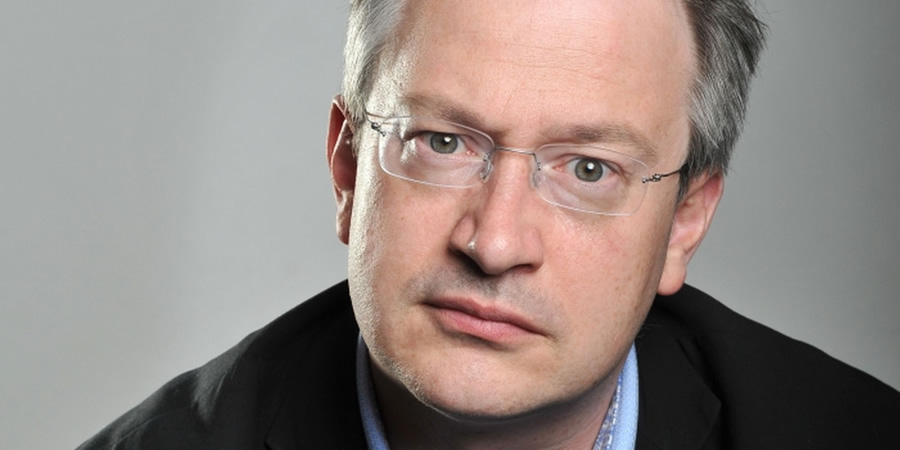
It probably says a lot about me that when I looked up 'Nine Lessons...' I assumed you'd be top of Google.
No, St Paul's Cathedral still has the edge on us, but we'll get there. I kind of in some ways would change the title a bit now. It was originally inspired by arguing with Christian fundamentalists who were aggressively unpleasant, and not in any way archetypal Christians: it was about the same time you were getting all those placards outside Jerry Springer: The Opera. Whereas I think now, things have moved on, culturally.
The phrase 'Godless People' does seem slightly jarring today.
I would have actually called it Nine Lessons and Carols for Curious People this time, also because, right from the start, its kind of a jokey title. People would say 'oh it's people banging on about how stupid religion is' - no, there are much more interesting things to talk about.
There was a point where I think some people thought this was part of a movement to cure people of their deities, but we often have religious people coming along, certainly when we do the shows with Brian Cox at Hammersmith, it's a very broad audience. It's a celebration of science more than anything.
I suppose Bush and Blair were in power then, the mid-2000s, the religious right had this massive influence, so it felt natural to push against it.
I think of some of the arguments that I've had when I've been at atheist do's, is that to me it's more important to have an anti-dogma movement. One of my favourite thinkers is Richard Holloway, who was the Bishop of Edinburgh...
I saw him do a great talk with Tony Benn a few years ago.
That was in Edinburgh wasn't it? He's such a compassionate human being, and there was a point where he thought 'why is my religion so hung up on things like sexuality?' His writing is very beautiful, because it comes from someone who got to the pinnacle of the position you can have within a church, and therefore where his doubt and compassion comes from is a very interesting mixture of places.
I remember Alain de Botton making a good point in Religion for Atheists - do atheists really want to knock those churches down? They're the nicest things in most towns...
No-one does though - I did think that some of his book was tilting at windmills. But if life has a limited timescale, it seems a pity to have to sign up to any form of belief that doesn't give you the freedom of understanding - the freedom to understand anything you want. In the same way that in some communist states, jokes and certain forms of art were banned. Anything that restricts the ability to express and understand is a pity.
This is quite a radical concept really, putting all these people on one stage.
It's something Stewart Lee was talking about the other day. I was doing a William Blake event - I've got the badge still - and it was Alan Moore, John Dowie, and the stonemason who was making the stone we were making the event for. She was incredible, I think her name was Kindersley, and she was the funniest stonemason we'd ever seen. A brilliant stonemason. Me and Stew were going 'that was bloody good stonemasonry chat wasn't it.'
He went on at the beginning, and went [does excellent Stewart Lee voice] "I was looking at this ramshackle collection of poets and wizards and comedians, and I thought 'Robin's the only one who links them...'"
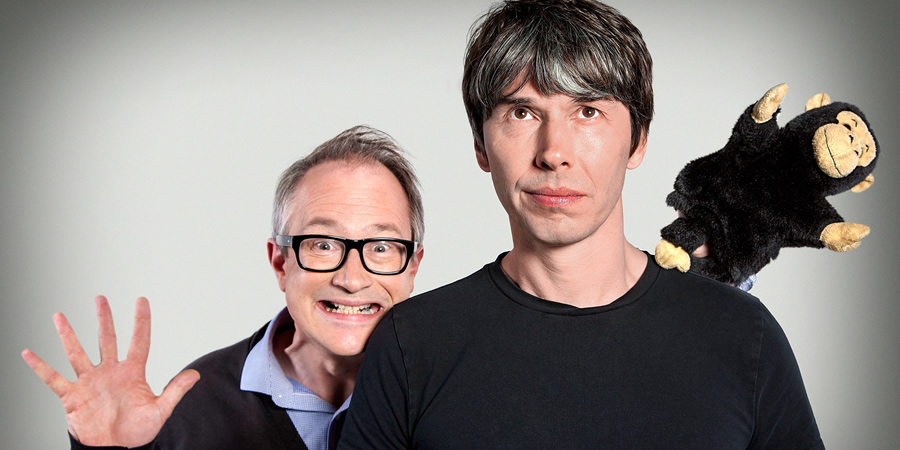
You do bring some interesting people together.
In some ways it's the return to a traditional variety show, and Monkey Cage as well. When we started doing it, I remember some of the reviewers felt quite cross about it, some of the newspaper critics saying 'this isn't the way science is supposed to be presented.'
My interest really came from when I started going to comedy when I was 15, in London clubs, you would see an a cappella singer, a double act doing an anarchic take on juggling, then the comedian...
Then the stripper...
Yeah! There was a stripper, Randolph the Remarkable, who would only strip down to his shorts: he went under the name of Hugh Jelly as well, did a lot of stuff with Julian Clary. The main part of his act, he'd go lie in a washing up bowl and wobble his big belly until there was enough suction that he'd stand up and the washing up bowl was attached to his belly - that's variety. Now of course all I valued was the scientific explanation of why the washing up bowl was attached to him...
My mind is quite frenetic and goes round a lot of different ideas, and I quite like the fact that a lot of the time with these shows, you're having so many ideas thrown at you - some are ridiculous, some are beautiful, some are noisy. A lot of people now, the way the internet works, it can continually steer you into what the algorithm has judged is your taste, and for any form of counter culture to exist, you have to find different ways of showcasing things that people didn't know they liked.
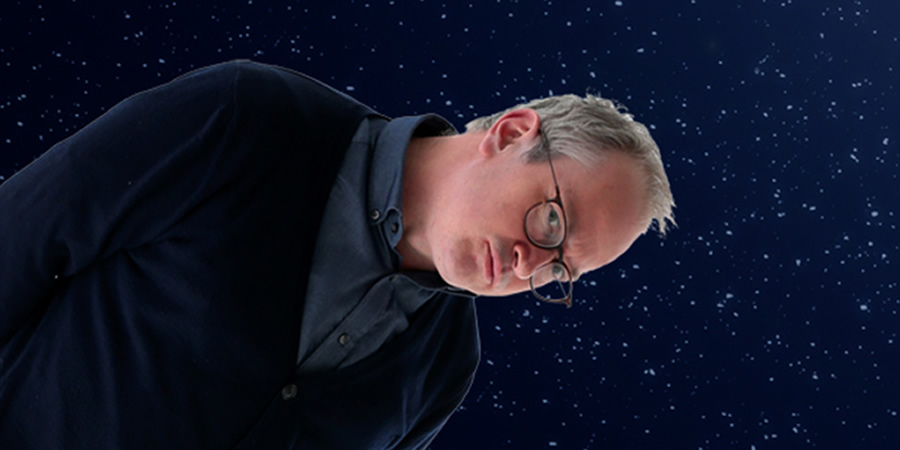
How did Nine Lessons start?
I was on this show, presented by Konnie Huq. It was a live discussion on ITV about the increasing secularisation of society, but when I got there, the title had changed from a philosophical one to Who's taking the Christ out of Christmas? and I thought 'Oh Christ' - there was Stephen Green from Christian Voice, Vanessa Feltz, Nick Ferrari.
And I got really annoyed, because there was so much misinformation there, they were talking about the one in Birmingham, 'Festivemas' or something - but even that wasn't 'stealing Christmas', they were separate things. I was so wound up that when I was in the car to do the next thing that night, I thought 'I'm going to do a show that's just a celebration of ideas.' So it came out of an act of benevolent spite by me.
The main thing, I used to do this show called The Book Club, which was an absurd variety show, and I thought 'this is fun, but why don't I do a variety show that has - as well as the absurdity - some way of luring people to the ideas?'
And your stand-up now works the same way...
I always describe my audience as a mix of goths and librarians, but everywhere I go there are just enough people, slightly leaning towards counter-culture.
The Book Club is one of the first nights I remember where comedians wouldn't do regular stand-up.
That was the interesting thing, sometimes people would ask to be on, and I'd say 'of course, but you should know, if you do your club stand-up set it probably will not work, because everything around it is so silly and strange.' but sometimes they'd turn up and decide to not take a risk, and not understand why it hadn't gone well.
Like when someone shoehorns in a bit of material on a chat show...
That lovely Des O'Connor style - 'Lovely to have you here, how do you feel about watches?' - bloody hell, Des. 'Freddie Starr, have you ever drunk from my shoe?'
Also the idea behind it, I got a sense in 2004/5 that the circuit at that point felt like it was becoming quite homogenised - when I was growing up I saw so much experimental stuff, I remember the first [Book Club] night, walking on, and saying 'thanks very much for coming out, I just want to say that everyone tonight will be trying something different - there may well be acts that you see that you don't really enjoy, but you must always remember, that that's your fault.'
Because sometimes you go on and the pressure to 'entertain' - then you don't take a risk and become bland. And that can come from prejudging an audience. I certainly had a long period of time, I look back at sets that I did and think 'why were you playing it so safe?'
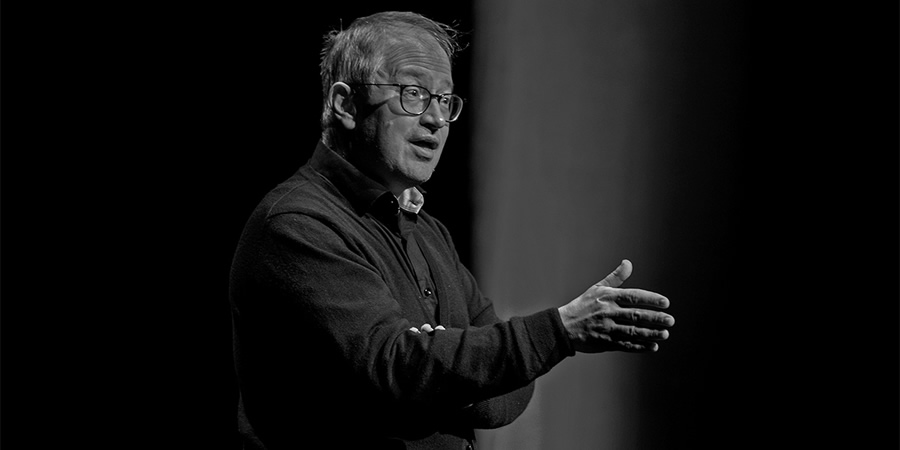
You were also quite influential in popularising Edinburgh's Free Fringe, early on.
There was a certain point where you'd done the things you were meant to do, and realised that a lot of them lead nowhere: bad telly, and being bad on good telly, I did that as well. Then I remembered what inspired me in the first place: alternative music, alternative comedy, not worrying about what the core demographic is going to be. Nearly all the things I've done over the last 13 years started off out as fun.
But I get the sense that they also came from anger - you rebelling against something else?
It comes from wanting things to be different. Book Club, I'd watch these incredible acts in Edinburgh, in 2004, and think 'that act won't work though, the way the circuit is now' - so let's make a club where they fit in. You can build it. A field of dreams!
Why did Nine Lessons stop for years? It does sounds a logistical headache.
It was just me saying 'I don't know what to do with this now,' so we stopped for a while, and the Bloomsbury [Theatre] closed, which was its natural home. Then a friend of mine said 'do you want to do it at Conway Hall?' It's a good place to put it on. Sometimes asking a scientist to do their first half- science, half-entertainment gig at Hammersmith Apollo is quite daunting, whereas Conway Hall is the home of humanism, it's quite a relaxing atmosphere. I just thought It'd be fun to do for four nights.
Did you actively develop the talking-quickly thing, to fit more into your own shows?
It really has become more and more that: every show I think will last 90 minutes, but this one in particular, it's about art, love, death and suicide.

You actually retired from stand-up for a few years...
I had to take a break. I was explaining to someone the other day, there's a point where the cracks in your sanity become wide enough to see yourself falling in. I found it harder and harder to do anything. I had two years where I had insomnia, I wasn't sleeping, I was touring incessantly, across the world.
I think that Broxbourne gig near me did it. I remember your tweets.
Yeah, but Hertford [Theatre]'s only down the bloody road, and Hertford was packed! Why was Broxbourne so empty? Maybe they had some strippers coming the next day.
What I found interesting, when I stopped, all my friends went 'there's no way you can stop, you always do so much, you'll feel you're missing something' - but I actually quite enjoyed it. I immediately started working on writing things.
Then it came back quite naturally. The first year off, I did a few little festivals and worked on a book, then Brian said 'do you want to come on tour,' so I'm actually spending 100 dates on tour, but I only had to do 30/35 mins onstage a night.
Did you have any idea how your career would go when you started out?
Any of my pre-planned ideas probably never happened, but the root of what I first saw, in the cellars of London on rickety chairs watching Rik Mayall, Alexei Sayle - now it seems to me a natural place to have ended up.
My problem was, I loved the idea of stand-up so much, I forgot what you could do with it. I was about 35 when I realised that you can take control over what you make. The greatest thing about stand-up or any art form that's immediate, you are in charge of your own failure. Sometimes you work on TV shows and they don't work out and someone says 'I saw that, it was shit' - you can always go 'we had a real problem with the producer.' There's always an alibi.
Whereas when they come to see one of my live shows, if they hate it, it's predominantly my fault. So I have to take it.
Or you can leave it, again - you've got enough other gigs going on.
I've had the good fortune to play arenas with Brian, and we're getting to do that again in 2019, and it's tremendously good fun - oddly enough it doesn't give you the same buzz to playing to 250 people in Bordon, but it's still a lot of fun.
Our technician said that they'd never seen two people more relaxed and un-hyped up before playing Wembley Arena. We're just having a chat, then Brian puts on his stage jacket and I brush down my cardigan.
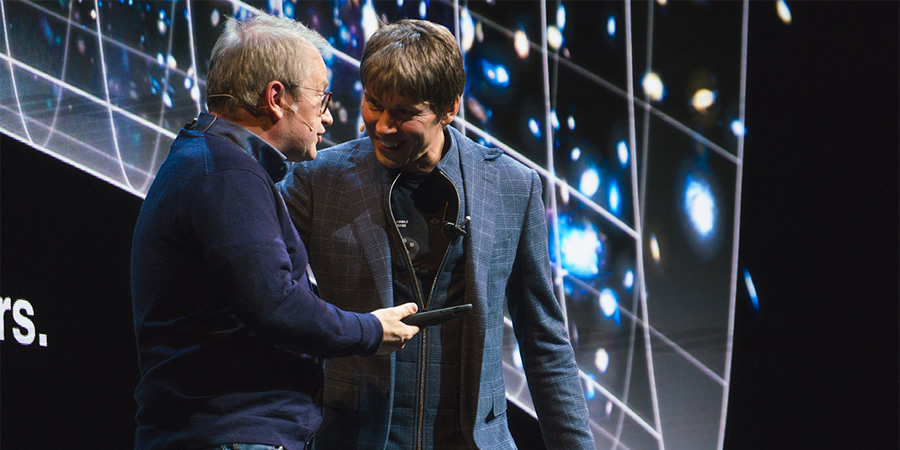
With the universe as a stage backdrop, if you went 'big' too it'd be too much?
Yeah, he was raised on a platform while doing an impersonation of Brian Blessed at Glasgow Hydro, and every single time I'd say 'make it go higher!' until it really looked like it was teetering. We need to come up with one other moment of preposterous theatricality for 2019.
It's funny what sticks - I definitely take time to just look at more amazing stuff now, after you drummed it in on a previous tour. And that's a comedian saying it.
I always bang on about George Carlin's thing, 'stand-up is a low art, but it's a very potent art.' One of the things I'm doing in my current show, I met a woman in Adelaide and one night we were talking, she was an ex-head teacher, and she said 'comedians should do more material about suicide.' The reason was that her daughter had killed herself.
And there's a bit in the show, which is quite an awkward transition in some ways, where I do about 10 minutes on suicide: it goes from laughter, laughter, then there's a but where the audience go 'I'm not entirely sure what to do.' And it's that moment that I'm most worried about fucking up. That's the story that I cannot translate wrongly, because I could send the wrong message.
What's been interesting, afterwards people have come up to me who've lost people, or themselves had mental health problems, and overall they go 'oh its good to see that kind of thing.'
And comedians are very good at editing an important subject down, in a way that's easy to pass on.
You also get comics who say 'yeah, but the most important thing is being funny.' But you can have funny too. if you're doing a two-hour show a night, there's nothing wrong with it.
The main thing for me is trying to remain interesting. Now obviously not everyone will find what I do interesting - but what I'm always attempting to do, and what a lot of my favourite comedians do, there are moments where you go 'right, there may not be a joke here, but I hope the idea is so potent that you'll excuse the lack of laughter.
You're always buying books, records and lord knows what else on your travels. What on earth do people buy you for Christmas?
You know what I do? I buy books from second-hand places, and I don't unwrap them: I say 'wrap up my post from the last three weeks.' I'll have forgotten that I bought that book, and it'll be a lovely surprise.
Nine Lessons and Carols for Godless People is at London's Conway Hall on December 16th, 19th, 20th and 22nd. Visit cosmicshambles.com/ninelessons for details.
Cox and Ince's book How to Build a Universe is available now via William Collins. Amazon
Help us publish more great content by becoming a BCG Supporter. You'll be backing our mission to champion, celebrate and promote British comedy in all its forms: past, present and future.
We understand times are tough, but if you believe in the power of laughter we'd be honoured to have you join us. Advertising doesn't cover our costs, so every single donation matters and is put to good use. Thank you.
Love comedy? Find out more